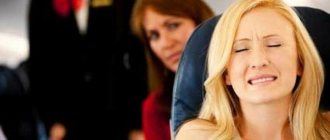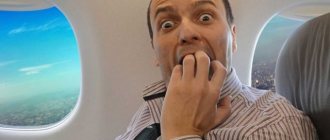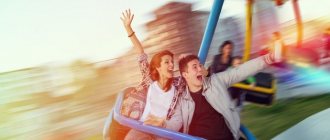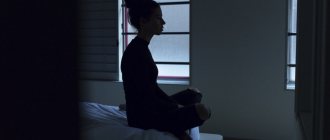Aerophobia is the strongest irrational fear of air travel. Such a seemingly insignificant problem actually brings great discomfort to a person suffering from such a disorder. Some people have to cancel vacations in warm countries, losing money, others refuse lucrative business offers. The result of ignoring such a problem is lost opportunities and pronounced psychological discomfort!
Aerophobia is a mental disorder , and since it is very difficult to get rid of it on your own, do not be afraid to seek professional help! Doctors at the Leto specialized clinic will individually select a course of psychotherapy that will relieve you of unaccountable fear.
Is there a cure for aerophobia?
Yes, aerophobia can be treated like any mental disorder. Doctors of the clinic named after. prof. F.F. Preobrazhensky helped dozens of patients with fear of flying on an airplane. The problem is that most people suffering from aerophobia are quite suspicious and have great difficulty going to see a doctor.
Contact a specialist
Sign up for a consultation tel. 242-82-65
Make an appointment
Leonid Leonidovich Kelin
KMN psychiatrist, narcologist, psychotherapist
A doctor of the highest category has specializations in psychiatry, narcology and psychotherapy
The principle of action of anxiolytics
The effect of medications that affect the psychological state is to reduce the excitability of the subcortical areas of the brain responsible for emotions.
These include the limbic system, hypothalamus and thalamus.
Limbic system
It regulates the activity of internal organs, smell, sleep, wakefulness. If you think that you are consciously motivated to engage in any type of activity, I hasten to disappoint you. This vital point is also regulated by the limbic system.
Surprisingly, even the creation of cognitive and research activities is also one of its functions.
As you can see, influencing the functioning of the limbic system is an important step in controlling emotions.
Thalamus
This part of the brain is otherwise called “visual thalamus”. Its main function is the transmission of information from the senses (except smell) to the corresponding areas of the cerebral cortex.
Due to the fact that the motor and sensory information reaching the brain undergoes some changes (due to the action of the drug), the somatic symptoms of the phobia disappear and anxiety decreases.
Eliminating the sensations of motion sickness, nausea, dizziness, and palpitations can in itself make flying on an airplane easier.
Hypothalamus
It is the central link between the nervous and endocrine systems.
The effects of medications help control the release of stress hormones (adrenaline, norepinephrine, cortisol). Correction of hormonal status allows you to influence various aspects of behavior, including those responsible for fear and panic.
In addition, it is responsible for thermoregulation. This helps control hot flashes and excessive sweating.
I hope, thanks to a short excursion into anatomy, you understood that the effect of fear pills is complex and is based on the regulation of the physiological functions of the body.
Eliminating the feeling of fear, these drugs have almost no effect on the body's production of dopamine and serotonin (happiness hormones).
This means that if the phobia was formed as a consequence of a mental disorder, anxiolytics will not be effective.
I won’t overload you with medical information. I’ll tell you better about what kind of body reactions you will get to taking drugs “for fear”. This will give you food for thought.
How is the fear of flying on an airplane treated?
In order to treat aerophobia, you must first understand the characteristics and source of fear in each individual case.
Hereditary predisposition
It is known that children of anxious parents are more susceptible to aerophobia. If a person has a family history of people who constantly see a lot of worries and dangers in the world, then the likelihood of developing aerophobia increases.
Education and childhood
The issue of childhood education is very important. Figuratively speaking, if a child climbs onto a chair, some parents will try to support his courageous act with the words “well, go ahead, jump, I’m with you.” And other parents will attack with shouts of “where did you get off, get off, you’ll fall.” What will happen when these children grow up? In the first case, a person will be able to react normally without prejudice to situations that are unusual for him, for example, flying on an airplane. In the second case, over the years, a person will find himself in a world full of dangers and uncertainty and will easily create a phobia for himself, which he himself will not be able to get rid of.
At the appointment, the doctor will carefully examine the type of aerophobia from which a particular patient suffers. Treatment will be based on this. Experts identify eight main types of aerophobia.
Identification of the type of aerophobia
Fear of flying may be based on:
- hypercontrol (the need for complete control over the situation),
- fear of death (thanatophobia)
- exaggerated fear of heights,
- claustrophobia, fear of closed spaces can form the basis of aerophobia. If a person is afraid to ride in an elevator or subway, then he will bleach and fly on an airplane. And he is not afraid that something will happen to the plane, but he is afraid that something will happen to his health if he cannot get out when he wants.
There are several other types of aerophobia, and the doctor will definitely highlight the nature and source of a person’s fear. And this is already half the success.
Aerophobia: features and clinical manifestations
According to statistics, about 10% of people suffer from this illness, another 15% experience anxiety and internal tension while in the sky. As a rule, aerophobia is diagnosed in young people over 25 years of age (55% women and 45% men). This disorder does not occur in children and adolescents.
It is extremely difficult for aerophobes to travel without strong sedatives. Some people refuse to fly, others feel severe anxiety during the flight, even to the point of panic attacks .
What is noteworthy is that people with aerophobia often add to their fantasies scenes of plane crashes seen in films or news videos. Therefore, panic attacks worsen, and a great fear of death appears, which, by the way, always underlies this disease. Without a doubt, such an instinct is necessary for a person, but only when his life is in real danger. In this case, the fear of death has no compelling reason.
Often young people mistakenly attribute this disorder to themselves, experiencing pre-flight anxiety, which is quite normal for many travelers. In fact, a phobia can only be diagnosed if a number of specific symptoms are observed in a person’s behavior:
- severe anxiety and even irritability while waiting for the day of departure;
- searching for information on how to cure aerophobia or calm down before a flight;
- refusal to use air transport;
- cancellation of plans at the very last moment, even to the point that a person changes his intentions right before boarding;
- obsessive thoughts about the plane crash;
- constant monitoring of air travel-related mortality statistics and news about tragedies that occurred on air flights;
- studying information about the reliability of the aircraft;
- choosing a long train ride when the alternative is a fast route in the air;
- taking large doses of alcohol before check-in or already on board the plane to reduce anxiety;
- taking medications (relaxants/tranquilizers) before the trip.
In addition, already on board an airplane, patients with aerophobia differ from others in their behavior:
- constantly listen to the sounds of the engine, fearing problems;
- have difficulty breathing;
- they monitor the flight attendants’ movements around the cabin and especially their faces, trying to catch at least a hint of anxiety, which may indicate a problem;
- they are afraid and panic even at the slightest turbulence;
- feel a rapid heartbeat throughout the flight and especially at the moment of landing;
- they often ask flight attendants if everything is okay with the plane and what they should do in case of an accident;
- are in constant physical tension, etc.
Finally, after landing, such passengers spend a long time “moving away” from the flight; often the thoughts of returning home by plane spoil the entire impression of the trip.
An integrated approach to the treatment of aerophobia
The treatment is based on psychotherapeutic techniques with a change in orientation and devaluation of fears. Various techniques of conscious and subconscious suggestion are used, with the use of additional relaxation techniques during sessions. Against the background of relaxation, information is placed on a deeper subconscious level. The necessary relaxation is achieved using acupuncture methods and special modern devices that stimulate the production of endorphins in humans.
Treatment for aerophobia usually consists of 10 individual psychotherapeutic sessions. The cost of a course of treatment is 20,000 rubles. Prices for certain types of psychotherapeutic services can be clarified in the section After a course of psychotherapeutic treatment, in agreement with the patient, we conduct special training in real flight conditions on an airplane.
How an aerophobe can prepare for a flight
Regardless of whether you have aerophobia or just a fear of air travel, following our recommendations you can reduce your anxiety level:
- Don't be late for your flight, check in as early as possible to avoid unnecessary stress and worry.
- Think in advance about how to distract yourself from anxious thoughts during the flight: you should download books, movies, and relaxing music to your phone (tablet or laptop).
- Choose a seat on the plane in advance, ideally if it is at the very beginning of the cabin, since the least turbulence is felt in the bow of the plane, and there is much less noise there. Do not sit at the window so as not to look at what is happening overboard.
- Learn to breathe correctly, this is especially important when symptoms of an upcoming panic attack appear. It is necessary to take a deep breath and exhale, counting the number of breathing movements to yourself, controlling their rhythm.
- Under no circumstances should you drink alcohol to calm down, as this leads to the completely opposite effect. The same goes for coffee and other tonic drinks, which increase your heart rate even more. It is better to drink clean drinking water.
Also, try to fall asleep by preparing an eye mask and earplugs in advance. Sometimes you can take a mild sleeping pill (of course, in the absence of contraindications).
Why the clinic named after. prof. F.F. Is Preobrazhensky recommended for the treatment of aerophobia?
- Unique psychotherapists, specialists in the treatment of phobias, authors of many books and articles on this topic, candidates of medical sciences, doctors of the highest category.
- Author's techniques that have shown practical results and are time-tested
- Complete anonymity and confidentiality of treatment
- The clinic has experience since 2000.
- Treatment under contract with guaranteed results.
- Possibility of strengthening the removal of fears during training in real flight conditions on an airplane with a psychotherapist
Come to our clinic and join the many happy people who have conquered their fear of flying.
Make an appointment
Psychotherapeutic techniques
Information about the influence of thoughts on a person’s physiological state is not secret. Scientific experiments have been conducted proving the strong effect of hypnotic techniques, including self-hypnosis, on somatic processes.
The very first thing a psychotherapist will teach you, having discovered obsessive thoughts, fears, and phobias in you, is the ability to relax.
The choice of relaxation techniques is quite large: breathing techniques, working with muscle tension, meditation, chanting mantras and much more. After analyzing your individual characteristics, the psychotherapist will select the most suitable technique for you.
At the initial stage of working with a psychotherapist, it is sometimes even useful to take medications at the same time. In addition to the properties described above, they make consciousness more pliable and receptive, which makes it easier to get rid of unwanted patterns of behavior and replace them with more effective ones.
Lifehacks to relieve anxiety and panic
Breathing exercises for calming Author: Oh, Sea
There are techniques that help you calm down quickly. One of them is square breathing. 1 – inhale, 2 – hold your breath, 3 – exhale, hold your breath for 4. And so in a circle, drawing a square in the imagination. Chewing gum helps a lot. The process itself calms and relieves nausea
Flight stimulator training
In some cases, you may be recommended to use a flight simulator to overcome your phobia of flying. This is a complete simulation of a real aircraft, which reproduces most situations possible during a flight.
At your own discretion, you can “take off” and “land”, adjust the weather or time of day (some are afraid to fly exclusively at night).
It is also possible to verify the reliability of the automatic control of the aircraft.
If a child develops aerophobia, what should parents do?
Aerophobia in a child Author: macos.livejourna
It is common for a child to be afraid of everything unknown and threatening. Fear of flying refers to obsessive states that appear in certain circumstances. It is important to prepare the child.
Veronica Petrovna advises explaining to the child in advance what will happen, telling about the planes and the airport. You can also bring your favorite toys, coloring books, and books to distract you during the flight.
Themed games help a lot. Definitely some kind of fairy tale with a good happy ending. Under no circumstances should you ask your child if he is afraid, if he is scared. Especially if he didn’t say it himself. After all, most likely, he did not even suspect that there were reasons to be afraid
Medications to take regularly for panic attacks
Constant use of pharmacotherapy allows you to stabilize the biochemical and physiological processes in the nervous system that are responsible for the development of panic attacks.
Basically, such drugs act on specific receptors in the brain and restore the normal activity of neurotransmitters: dopamine, serotonin, norepinephrine, adrenaline, acetylcholine and others.
Antidepressants
Mainly affects serotonin receptors of the nervous system. They are used in courses of several months (from three to more than a year). The most “popular” and common antidepressants for preventing panic attacks:
- Escitalopram (cipralex, elicea);
- Paroxetine (Paxil);
- Amitriptyline;
- Sertraline (Zoloft);
- Fluvoxamine (fevarin).
Neuroleptics
They act predominantly on dopamine receptors in the brain. Prescribed in cases where panic attacks are a manifestation of an endogenous disease. Like antidepressants, they are taken for a long time from several months to several years.
Contrary to popular belief among people with anxiety disorders, they do not cause addiction. The most commonly used antipsychotics for long-term treatment of panic attacks are:
- Thioridazine (Sonapax);
- Sulpiride (eglonil);
- Quetiapine (Seroquel);
- Risperidone (rispolept);
- Flupenthixol (fluanxol).
Normotimic drugs
Their mechanism of action is the normalization of the ratio of excitation and inhibition processes in the brain. Most effective for panic attacks due to encephalopathy, consequences of traumatic brain injuries, strokes, and hypoxia.
The most common representatives of normotimics:
- valproic acid (Depakine Chrono),
- lamotrigine (Lamictal),
- carbamazepine (finlepsin).
To summarize, it can be noted that among the above-listed medications there are several drugs with a universal effect: they are suitable both for a single dose to quickly relieve a panic attack, and for long-term use. These are the antidepressant amitriptyline and the antipsychotics quetiapine, thioridazine and sulpiride.
This material is for informational purposes only. Under no circumstances should you use the medications described above for panic attacks on your own. Any use of the drug should only be as prescribed by a doctor! Don't self-medicate!










